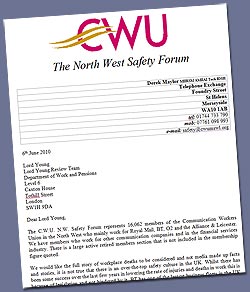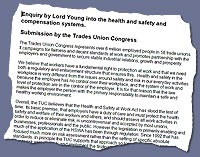CWU North West Safety Forum Responds To Lord Young's Review
Lord Young gave very limited time for anyone to respond to his intended review of health and safety culture and legislation when announcing in June that he wished to consider views from all interested parties. He gave them until 6th July to submit opinions.
As reported on this website in June, CWU's National Health, Safety & Environment Officer, Dave Joyce urged all Unionsafety reps to respond to the government's review of health and safety. You can download both Lord Young's letter to the CWU and Dave Joyce's response in full.
 The CWU North West Safety Forum, representing all CWU Branches within the north west with 16,062 members who mainly work for Royal Mail, BT, O2 and the Alliance & Leicester; discussed the call for opinion and submitted a letter detailing the view of the safety forum. Signed by Derek Maylor, Chair of the CWU NW Safety Forum, the letter called attention to the fact that current figures for workplace deaths and injury are not all inclusive.
The CWU North West Safety Forum, representing all CWU Branches within the north west with 16,062 members who mainly work for Royal Mail, BT, O2 and the Alliance & Leicester; discussed the call for opinion and submitted a letter detailing the view of the safety forum. Signed by Derek Maylor, Chair of the CWU NW Safety Forum, the letter called attention to the fact that current figures for workplace deaths and injury are not all inclusive.
Derek wrote:
"We would like the full story of workplace deaths to be considered and not media made up facts and stories, it is not true that there is an over-the-top safety culture in the UK. Whilst there has been some success over the last few years in lowering the rate of injuries and deaths in work this is because of legislation and not hindered by it. BT has one of the largest business fleets in the UK and we are concerned that not included in HSE statistics were the 1000+ drivers killed whilst in work. Traffic accidents at work are the single biggest cause of work-related deaths in the UK. In 2008, 2,538 people died on Britain’s roads and a further 230,905 suffered injury and the road safety charity Brake said that at least one in four deaths involves someone driving for work."
Derek goes on to criticise the media:
"
We also note that there is less health and safety legislation currently than 30 years ago despite media such as the Daily Mail ridiculing it – but then they have never worried about printing a story even if it is untrue."
He adds further criticism for the employer:
"
It has become apparent that many company directors continue to show little concern for health and safety in the boardroom; we therefore need statutory directors' duties on safety as it is the only alternative. The HSE evaluation of the voluntary measures taken on director leadership of health and safety showed that the IoD/HSE voluntary guidance had, by November 2009, led to only 36 per cent of directors having any idea of the existence of the guide which was published in October 2007. Less than 1 in 5 had even read the document proving health and safety is not treated as a boardroom issue and that self-regulation simply does not work. Unless a company is compelled to do something it will not; unless company directors have a positive legal duty to take responsibility for health and safety practices in their company they will not."
Derek's letter concludes:
"We therefore vigorously oppose the weakening of workplace health and safety legislation when it is already under enforced and the HSE under funded with too few frontline inspectors. We also add that much of the “bonkers/conkers” stories peddled by the media would be non workplace and come under civil law anyway.
When the public is questioned most people consider that health and safety either saves lives or means workers don't become ill or get hurt at work. But 'health and safety' is an merely a quick excuse to rolled out by the media when the job of making something work takes more effort than stopping it. Ridiculous tales in the media trivialise health and safety, diverting attention away from getting the job done on time, in profit and safely – with workers going home healthy to return the following day."
You can read the full submission from the CWU NW Safety Forum by clicking on the pic above (Word format)
In a separate submission, Tracy Buckley Secretary of the BTU North West Health & Safety Co-ordinators Committee urged Lord Young to consider several issues when reviewing health and safety at work. She wrote:
"When you are reviewing health and safety can you take into account how many employers look for ways to flout basic health and safety and look for ways to circumvent anything they are not happy with.
I represent employees who work in Call Centres. Their days are very strictly monitored and individuals are informed exactly when they need to start, when they should take a break and when they should go home. It is not unusual for someone’s day to be planned out like this:
8.00am Start
10 am Lunch
3pm break
5pm finish.
The reason for the early lunch is so that the business does not have to give them a break in the morning. Sometimes the day is planned with a very late lunch so that they can avoid a break in the afternoon.
Without H&S Legislation to fight back with and to force employers to adopt a reasonable approach to their employees I dread to think what kind of working day employers would expect."
 The TUC's response pointed out to Lord Young a significant difference between health and safety generally and that of the workplace:
The TUC's response pointed out to Lord Young a significant difference between health and safety generally and that of the workplace:
"We believe that workers have a fundamental right to protection at work and that we need both a regulatory and enforcement structure that ensures this. Health and safety in the workplace is very different from the issues around safety and risk in our everyday activities because the employee has no control over their workplace, and the system of work and level of protection are in the control of the employer. It is for that reason that the law makes the employer the person with the primary responsibility to maintain a safe and healthy working environment."
You can download the TUC full response to Lord Young by clicking on the pic above (Word format)
Source: CWU / TUC / Unionsafety



